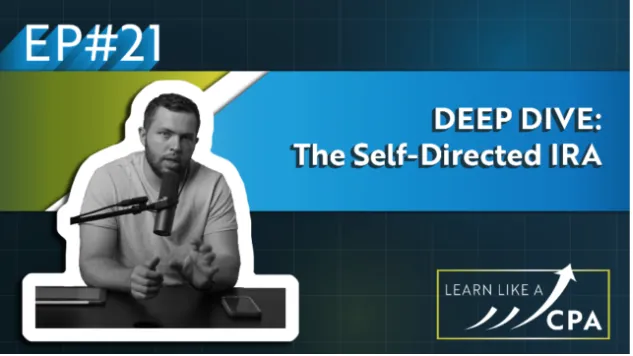Latest blogs and articles
Leading you to a better financial future.

Deep Dive: The Self-Directed IRA
Deep Dive: The Self-Directed IRA
Self-Directed IRAs are one of my favorite investment vehicles! They give you the tax benefits of a retirement account while maintaining the freedom of other types of investments. You can invest in real estate, businesses, livestock, crypto, and a multitude of other assets within the confines of a retirement account.
I went over what a self-directed IRA is in a podcast episode a while back: https://open.spotify.com/episode/2lri0K8wDbfxqJwRQsXcLE?si=1a3a1b8e1ea9467a
Despite all the benefits, SDIRAs aren’t for everyone. There’s a handful of restrictions that make them imperfect and may not be right for you.
For example, there are a lot of restrictions on real estate and the way you can transact within the IRA. You’re required to have a property manager, and there’s certain scenarios in which you’ll have to pay an extra UBIT tax (Unrelated Business Income Tax).
Another restriction is that your IRA is a separate taxpayer, which means you can’t offset real estate income from outside the IRA with real estate losses within the IRA (or vice versa).
For these reasons, I don’t recommend a SDIRA for inexperienced real estate investors. However, if you’re a more seasoned real estate investor, then properly using an SDIRA can allow you to build wealth without triggering a taxable event.
At the end of the day, the self-directed IRA is a tool, and can be used correctly or poorly. By understanding the features and restrictions of this investing vehicle, you can make sure you’re getting the absolute most out of your investments.
To dig deeper into the self-directed IRA and its restrictions, check out my recent podcast episode:
Deep Dive: The Self-Directed IRA
Join my Facebook group with over 9,000 real estate investors!

Choose Your Journey to Tax Excellence
Journey 1
Building a Tax Advisory & Consulting Practice
Scale, streamline, and systemize your advisory business.
Turn compliance clients into year-round advisory opportunities while mastering operational efficiencies for sustainable growth. This track covers pricing, hiring, marketing, and client engagement essentials to help you build a practice you love.
WHAT YOU’LL LEARN:
Crafting solid engagement letters and pricing models.
Transforming compliance clients into year-round
partners.
Marketing
strategies that drive consistent growth.
Recruiting and training the right team to scale your business.
Bonus:A Power Checklist for the ultimate year-end tax planning session.
Journey 2
Tax and Legal Foundations: Core Strategies for All Levels
Master the fundamentals that drive financial success.
Perfect for business owners and advisors, this track delivers essential insights on asset protection, tax planning, estate strategies, and IRS compliance.
WHAT YOU’LL LEARN:
Unlock estate planning with Revocable Living Trusts.
Maximize retirement savings through Solo 401(k) plans.
Real estate strategies: Short-term, long-term, and self-rentals.
Learn asset protection that actually works.
Navigate IRS resolution with confidence and ease.
Journey 3
Advanced Insights: Unlock Complex Tax Strategies
Top-tier strategies for high-value clients.
Designed for experienced professionals, this track offers in-depth guidance on prime tax strategies, entity structuring, and payroll solutions. Gain the insights needed to handle complex business scenarios with confidence.
WHAT YOU’LL LEARN:
Report multi-entity structures with Forms 1065 & 1120S.
Maximize tax savings using Bonus Depreciation & Section 179.
Seamlessly relocate clients to tax-free states.
Navigate business sales and acquisitions smoothly.
Use 105 Plans to save clients on healthcare costs.

2024 Learn Like A CPA. All rights reserved.